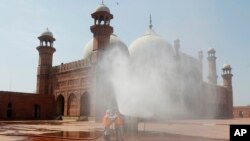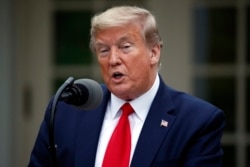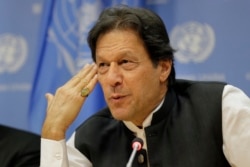U.S. President Donald Trump pledged help to Pakistan in its fight against the COVID–19 pandemic, during a phone call with Pakistani Prime Minister Imran Khan Wednesday.
Trump and Khan agreed to continue working together on a coordinated response to defeat the coronavirus and minimize its economic impact, according to a brief White House statement.
Khan’s office said he conveyed Pakistan’s sympathies and condolences “on the loss of so many precious lives” in the United States due to the coronavirus.
Trump appreciated the prime minister’s telephone call and expression of support for U.S. efforts to combat the pandemic, it added.
“He also reassured of U.S. support to Pakistan in the efforts to combat COVID-19 including by making available ventilators as well as in the economic arena,” said the Pakistani statement.
Washington has already announced more than $10 million in financial assistance for Islamabad to boost its efforts against the pandemic, though the number of confirmed cases in the nation of 220 million remains relatively low, as of now.
Pakistan has so far recorded more than 10,000 infections, and the virus has killed at least 212 people since the country detected the outbreak in late February.
The ensuing nationwide partial lockdown to contain the spread of the virus hit the already struggling Pakistani economy hard, rendering millions of daily wage workers jobless in a country where an estimated 40% of people live below the poverty line.
Khan’s government has announced an $8 billion package to support more than 12 million low-income affected families and help Pakistani businesses.
Pakistan has also received emergency financial assistance and medical supplies from close ally China, where the pandemic originated before spreading across the globe.
Chinese ambassador Yao Jing explained in a video statement Wednesday that his government has “donated $4 million in cash” to help build a quarantine hospital in the Pakistani capital, Islamabad.
“We have also donated around 150,000 PCR kits, more than 3 million medical masks, 500,000 N95 masks and about 200 ventilators so far,” Jing said.
The Chinese government also sent a team of medical personnel to Pakistan for two weeks to share their expertise with local counterparts on how to effectively prevent the spread of the virus and treat patients.
Improved US-Pakistan ties
Washington’s crucial backing in global lending institutions has enabled Pakistan to secure financial relief and an urgent soft loan of nearly $1.4 billion from the International Monetary Fund (IMF) to deal with the economic fallouts of the COVID-19 disease.
Pakistan’s traditionally uneasy and mistrusted relations with the United States have seen significant improvement under Khan’s nearly two-year-old government.
Islamabad’s role in facilitating Washington’s recent landmark agreement with the Afghan Taliban to help end America’s longest oversea military intervention in Afghanistan is credited with the improvement in bilateral ties.
Khan, in his Wednesday’s conversation with Trump, highlighted Pakistan’s “steadfast” support for Afghan peace and stability, and the importance of political settlement to the 18-year-old conflict in the neighboring country, the Pakistani statement noted.
“The prime minister reaffirmed Pakistan’s support for facilitation of the Afghan peace process and underscored the importance of next steps leading to the earliest commencement of intra-Afghan negotiations,” it said.
The U.S.-Taliban deal requires the insurgent group to engage in a dialogue with other Afghan factions and civil society groups to negotiate sustainable peace and power-sharing to end four decades of hostilities plaguing the country. U.S. and coalition troops are committed under the pact to withdraw from Afghanistan by July 2021.
VOA White House Bureau chief Steve Herman contributed to this report.






